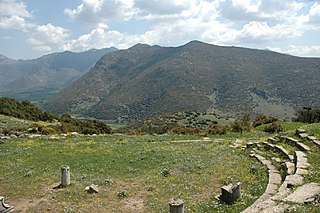Peisistratus was a tyrant of Athens, Greece, three different times between 561 and 528 BC.

Magna Graecia is a term that was used for the Greek-speaking areas of Southern Italy, in the present-day Italian regions of Calabria, Apulia, Basilicata, Campania and Sicily; these regions were extensively populated by Greek settlers starting from the 8th century BC.
Apollodorus was a popular name in ancient Greece. It is the masculine gender of a noun compounded from Apollo, the deity, and doron, "gift"; that is, "Gift of Apollo." It may refer to:

Sicyon or Sikyōn was an ancient Greek city state situated in the northern Peloponnesus between Corinth and Achaea on the territory of the present-day regional unit of Corinthia. The ruins lie just west of the modern village of Sikyona. An ancient monarchy at the times of the Trojan War, the city was ruled by a number of tyrants during the Archaic and Classical period and became a democracy in the 3rd century BC. Sicyon was celebrated for its contributions to ancient Greek art, producing many famous painters and sculptors. In Hellenistic times it was also the home of Aratus of Sicyon, the leader of the Achaean League.
Athenagoras may refer to:
The name Dionysius was common in classical and post-classical times. Etymologically it is a nominalized adjective formed with a -ios suffix from the stem Dionys- of the name of the Greek god, Dionysus, parallel to Apollon-ios from Apollon, with meanings of Dionysos' and Apollo's, etc. The exact beliefs attendant on the original assignment of such names remain unknown.
Ameinias is an ancient Greek name which may refer to:

Timotheus is a masculine given name. It is a latinized version of the Greek name Τιμόθεος (Timόtheos) meaning "one who honours God", from τιμή "honour" and θεός "god". The English version Timothy is a common name in several countries.

Velia was the Roman name of an ancient city on the coast of the Tyrrhenian Sea. It is located near the modern village of Novi Velia near Ascea in the Province of Salerno, Italy.
Hiero or hieron is an ancient Greek shrine, temple, or temple precinct.

Orchomenus or Orchomenos was an ancient city of Arcadia, Greece, called by Thucydides the Arcadian Orchomenus, to distinguish it from the Boeotian town.
Hicetas was a Pythagorean philosopher from Syracusae Sicily.
Aristodemus was a mythological figure who was a descendant of Heracles.
Nearchus was a ruler of the Greek city of Orchomenus in Arcadia. He was probably a tyrant and is known only from an inscription relating a treaty with the Achaean League in which he agrees to renounce his post while the Orchomenians promise not to prosecute him or his sons.
Nearchus was a tyrant of the ancient Greek city of Elea in Magna Graecia, who ruled in the 5th century BC. He is only known from an anecdote in connection with the philosopher Zeno of Elea, whom Nearchus tortured and, according to some sources, executed for having conspired against Nearchus's regime.
At least two ships of the Hellenic Navy have borne the name Nearchos after the ancient Cretan admiral Nearchus:
This page is based on this
Wikipedia article Text is available under the
CC BY-SA 4.0 license; additional terms may apply.
Images, videos and audio are available under their respective licenses.




